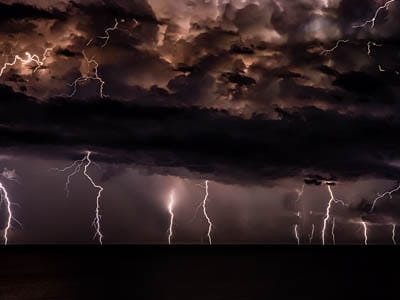
Can My HVAC Get Damaged By Thunderstorms?
A lightning strike is when an electric discharge from the atmosphere is sent down into an earth-bound object. Lightning is extremely hot—a flash can heat the air around it to temperatures five times hotter than the sun’s surface. This heat causes surrounding air to rapidly expand and vibrate, which creates the pealing thunder we hear a short time after seeing a lightning flash. Most lightning strikes do not touch humans and the odds of being struck by lightning are very low. In fact, the chances of being struck by lightning are 300,000 to one.Many houses are grounded by rods and other protection that conduct a lightning bolt’s electricity harmlessly to the ground. Homes may also be inadvertently grounded by plumbing, gutters, or other materials, while grounded buildings offer protection. However, when lightning strikes a house, it can create a surge powerful enough to destroy all kinds of equipment. Computers and other home electronics, washers, dryers and refrigerators, and yes, even AC units, are sometimes useless after a storm hits. Specifically, a lightning strike can melt the plug into your unit. The air conditioner’s control panel is full of sensitive electrical circuitry which can be damaged.
If you live in the lightning country, you can protect your HVAC unit by shutting it down when the weather starts acting up. In addition, clean dirt and debris from your backyard to prevent it from blowing inside your HVAC unit, which can damage circuitry. Keep the area clear of things like garden tools and outdoor furniture.
After the storm passes you should consider an HVAC inspection. Performed by a qualified specialist, HVAC inspections will tell you how your home’s heating and cooling systems are functioning, and if any repairs are warranted, as well as a replacement.

